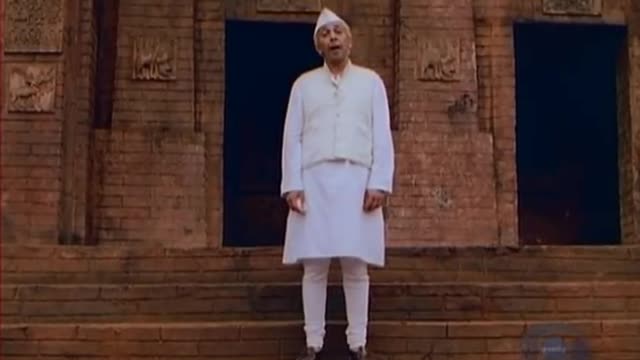Premium Only Content

Bharat Ek Khoj 02: The Beginnings
Episode 2: The Beginnings
With Harish Patel, Pallavi Joshi, Lalit Tiwari, Adil Rana, Pankaj Berry, Murari, Mahendra Raghuvanshi, Siraj Ahmad Khan
When Nehru stood on a mound of Mohenjo Daro in the Indus Valley and all around him lay the houses and streets of the ancient city that existed over 5000 years ago, he had the astonishing thought, that any culture or civilisation that has a recorded history dating back to the Paleolithic and Neolithic rock-arts should have a millennium-old continuity, while changing and progressing all the time. India was coming into close contact with the Persians, the Egyptians, the Greeks, the Chinese, the Arabs, the Central Asians, and even the people of the Mediterranean.
Spread as far apart as Kathiawar in the west and Ambala district of the Punjab, people of the Indus cities had many contacts with the Sumerian civilisation of that period. Indian manufacturers reached even the markets on the Tigris and Euphrates in ancient Mesopotamia. Our story unfolds lively transactions in commerce and art, exchange of silver- based currency, temple rituals and processions carrying living goddesses on sequined shoulder- thrones with scrumptious cross-country love affairs on the side. There is an overall stamp of sophistication in the decorated earthenware, the engravings on the seals, the humped bulls and the exquisitely supple-bodied dancing-female statuettes. There is a surprising wealth of ornaments of gold, silver, precious stones and vessels of beaten copper.
Who were these Indus people with their unsurpassed glyptic arts? Where did they come from and how did they connect to their sister civilisations of Persia, Mesopotamia and Egypt? It was an urban civilisation where the merchants were wealthy and streets lined with small shops, giving the impression of an Indian bazaar today. How did it decline and yield to the hordes of horse-riding invaders looking aggressively for farming space and abundant animal-wealth? We see the enactment of an epic story, the mysterious figure of Gilgamesh, the superhuman warrior in a fearsome mask, being placated for mercy, when equestrian marauders suddenly overrun the venue of the drama.
Between the Indus Valley civilisation and the present in India, there are many gaps about which we know little, felt Nehru. But there is always an underlying sense of continuity, of an unbroken link, which joins modern India to the far distant period of over half a millennium, when the Indus Valley civilisation probably began.
Producer Doordarshan
Language Hindi
-
 4:03:43
4:03:43
Benny Johnson
5 hours ago🚨Pete Hegseth Senate Confirmation Vote Happening LIVE NOW | MAJOR Shakeup at Pentagon
109K310 -
 2:14:18
2:14:18
FreshandFit
3 hours agoCastle Club Zoom Call Show
18.5K4 -
 1:01:08
1:01:08
SNEAKO
2 hours agoFRIDAY NIGHT VIBES
11.3K -
 1:16:47
1:16:47
Talk Nerdy 2 Us
9 hours agoTrump’s Biggest Sign, Sticker Mule’s Secrets & The Cybersecurity Threats They Don’t Want You to Know
2.94K5 -
 4:57:20
4:57:20
Robert Gouveia
6 hours agoHegseth Final Vote; Trump SLAPS Biased D.C. Judge; Rebuilding North Carolina
21.3K43 -
 47:40
47:40
Man in America
7 hours agoCan Trump Avert Economic Disaster Amid a $35T Debt Crisis? w/ Collin Plume
16.9K2 -
 LIVE
LIVE
I_Came_With_Fire_Podcast
10 hours ago🔥🔥Trump’s FIRST WEEK, FTOs, Deportations, & JFK FILES🔥🔥
222 watching -
 5:26:14
5:26:14
Barry Cunningham
7 hours agoTRUMP DAILY BRIEFING: PETE HEGSETH & KRISTI NOEM CONFIRMATIONS - TRUMP IN CALIFORNIA!
12.5K26 -
 2:06:17
2:06:17
Joker Effect
2 hours agoWhy So Serious Gameplay: Making scrubs in Brawlhalla cry baby tears.
5.62K3 -
 1:24:02
1:24:02
Roseanne Barr
6 hours ago $2.60 earnedDaddy's Home | The Roseanne Barr Podcast #84
35.1K55